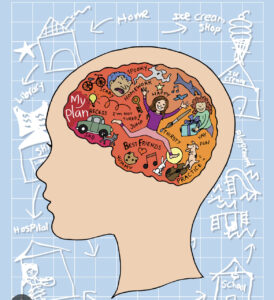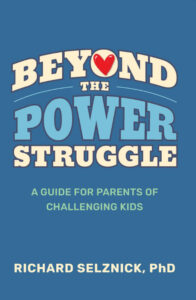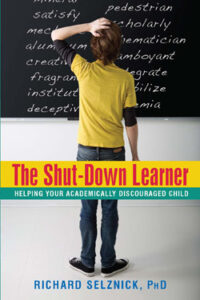“Reading Comprehension Challenges & School Bus Problems: What’s the Connection?”
 When Kids struggle with reading comprehension it is interesting that there often is an overlap in “real life,” that is in the way the child interacts in their personal world.
When Kids struggle with reading comprehension it is interesting that there often is an overlap in “real life,” that is in the way the child interacts in their personal world.
In this era of automatically labeling and pathologizing behavior as “ADHD,” this overlap is something rarely considered, but I think it is worth reflecting on its implications.
Here’s an example.
12 year old Logan is a boy who recently got into a lot of trouble when he used inappropriate language (along with other inappropriate behavior) on the bus. When the bus driver tried to correct him, Logan doubled down and got mouthy and defensive.
In other words, Logan showed a lot of bad judgment.
Compounding this, when Logan’s parents attempted to discipline him, rather than become low-key and contrite, he became belligerent, while melting down.
(I know, everyone’s pulling out their, “ADHD checklists” and quickly putting him on medication, but I’m not so sure. We need to dig a little deeper.)
Upon meeting Logan, he comes across pretty straight-forwardly and readily admits he has a problem managing anger. Particularly noteworthy, Logan felt bad about what happened and he regretted his behavior.
So, what’s the connection with reading comprehension?
Simply, Logan didn’t make connections while reading. For example, Logan couldn’t make inferences or answer “why” questions, as in “Why did a character behave in a certain way?” Logan tended to respond quickly without giving the question much consideration, which is not a good strategy for inference type questions or ones involving drawing conclusions.
What does Logan need? While many practitioners would quickly go to medication, Logan needs direct instruction in the skill of making inferences , in other words help with reading the clues. Also, in is personal world Logan needs help with learning to read the signals and the consequences of his actions.
Neither of these will be easy and it will take time to chisel away on developing the skills (socially and academically), but with guidance, feedback and practice the skill of comprehension and the skill of social interaction can be developed.
When given feedback directly to Logan and his parents following an assessment, Logan felt good about what was said to him and his personal “battery” was recharged, since he was told he was smart and that he could improve. Logan was determined to start “reading the clues” better.
Takeaway Point
There may be a connection as to how a kid behaves on the school bus, manages emotions and comprehends while reading.
Look for common themes.
To receive future blog posts, register your email: https://shutdownlearner.com.
To Contact Dr. Richard Selznick for advice, consultation or other information, email: shutdownlearner1@gmail.com.

 Copyright, Richard Selznick, Ph.D. 2023, www.shutdownlearner.com.
Copyright, Richard Selznick, Ph.D. 2023, www.shutdownlearner.com.

 This blog can occasionally serve as a bit of a confessional, providing me with a forum to voice some concerns regarding the issues that emerge while working with struggling children and their parents.
This blog can occasionally serve as a bit of a confessional, providing me with a forum to voice some concerns regarding the issues that emerge while working with struggling children and their parents. Oliver, age 8, has difficulty behaving in his third grade class.
Oliver, age 8, has difficulty behaving in his third grade class. Parents commonly come in with common questions such as, “Does their child have ADHD?” or “Is my child dyslexic?”
Parents commonly come in with common questions such as, “Does their child have ADHD?” or “Is my child dyslexic?” Synonyms for “nonchalance:” apathy, complacence, indifference, unconcern, torpor
Synonyms for “nonchalance:” apathy, complacence, indifference, unconcern, torpor An issue often overlooked with children diagnosed as ADHD is a frequently occurring underlying variable of social judgment and difficulty with “reading” cause and effect. Difficulty with reading cause and effect impacts both social and academic functioning, such as understanding inferences with reading comprehension.
An issue often overlooked with children diagnosed as ADHD is a frequently occurring underlying variable of social judgment and difficulty with “reading” cause and effect. Difficulty with reading cause and effect impacts both social and academic functioning, such as understanding inferences with reading comprehension. Largely supported by the medical model, when parents have their child assessed they are often focused on “the diagnosis.” Such a model embodies a, “Yes, they have it,” or “No, they don’t have it,” (whatever “it” is) perspective.
Largely supported by the medical model, when parents have their child assessed they are often focused on “the diagnosis.” Such a model embodies a, “Yes, they have it,” or “No, they don’t have it,” (whatever “it” is) perspective. A common concern raised by parents (well, mostly the moms) is their child’s lack of what they label as “executive function deficits (EFD).”
A common concern raised by parents (well, mostly the moms) is their child’s lack of what they label as “executive function deficits (EFD).” As noted in the previous blog, with children showing challenging behaviors causing you tremendous stress, you were encouraged to adopt a mantra helping you remain in your center, as you speak one “Didja” (e.g., “Didja you do your homework?”) after another.
As noted in the previous blog, with children showing challenging behaviors causing you tremendous stress, you were encouraged to adopt a mantra helping you remain in your center, as you speak one “Didja” (e.g., “Didja you do your homework?”) after another. Copyright, Richard Selznick, Ph.D. 2023, www.shutdownlearner.com.
Copyright, Richard Selznick, Ph.D. 2023, www.shutdownlearner.com.